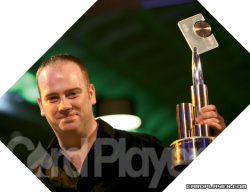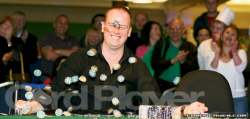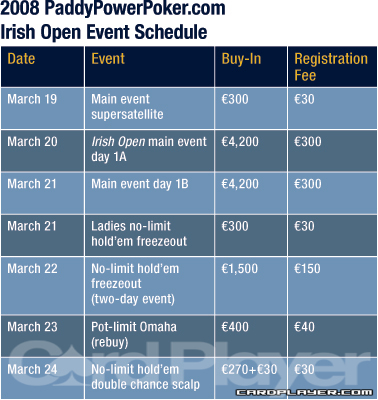






GoldSmythMarty Smyth Set to Defend Irish Open Titleby Nic Whelan | Published: Mar 01, 2008 |
|
|
By any standard, it has been an incredible year for Marty Smyth. Over the past 12 months, the Belfast man has propelled himself to stardom with a victory at the 2007 Irish Open and back-to-back final tables at the Poker Million. These three major  televised successes may have launched Smyth into the poker stratosphere, but he still has his feet very much on the ground. Card Player caught up with the popular Northern Irishman as he prepares to defend his title in the €3 million-guaranteed paddypowerpoker.com Irish Open this Easter.
televised successes may have launched Smyth into the poker stratosphere, but he still has his feet very much on the ground. Card Player caught up with the popular Northern Irishman as he prepares to defend his title in the €3 million-guaranteed paddypowerpoker.com Irish Open this Easter.
Nic Whelan: Has your life changed since winning the 2007 Irish Open?
Marty Smyth: Maybe a little bit. A handful of times, I've had guys I don't know coming up to me in a bar and saying, "Are you the guy who won the Irish Open?" or, "All in with 2-2 ... are you mad?" This is always a strange feeling, but nice at the same time. "You look heavier on TV"; that's another one that I obviously never tire of hearing.
Things haven't really changed that much. At the start of the summer, I bought another house that cost me more than I got for the Irish Open win, which meant my bankroll was back to about the same as it was before, so I'm still putting in the same hours online, and playing the same size of cash games that I always did. I did get a bit of a sponsorship deal, though, mainly off the back of the win, so I've been able to play a few more big live tournaments than I otherwise would have.
NW: What was more important - the money or the title?
MS: Hard to say … it's a lot of money (€650,000 for first place). At the time, maybe the money was more important. It's only afterward that you realise how much difference there is between winning and coming second, and not just in terms of sponsorship, and so on. Second would have still been a good achievement, but in a few years, it would have been forgotten about. But if you win the thing, your name's always going to be there on the list of past winners. Even now, I still get people I haven't seen since the win coming up and congratulating me, and it's a feeling you never get tired of.
NW: Was it always an ambition of yours to win the Irish Open?
MS: I think it's an ambition of any Irish player. I made the final table twice before, and I did have a feeling that I might win it one day. However, that was when the tournament was getting like 50-100 runners, and it wouldn't have been (all that) unlikely. A few years later, it's getting 300 runners, then 700-plus runners, and while you'd still love to win it, you realise that  - just like your ambitions of winning the World Series main event or sleeping with Kylie Minogue - realistically, it's never going to happen. But, of course, that goes for everyone, and once every year, someone overcomes huge odds and does win the Irish Open or the World Series, and it's overcoming those unrealistic odds that makes winning a major tournament so satisfying.
- just like your ambitions of winning the World Series main event or sleeping with Kylie Minogue - realistically, it's never going to happen. But, of course, that goes for everyone, and once every year, someone overcomes huge odds and does win the Irish Open or the World Series, and it's overcoming those unrealistic odds that makes winning a major tournament so satisfying.
NW: What was your game plan at the final table?
MS: Pretty similar to my game plan for any tournament. I play pretty tight for the most part, and try to maintain my stack by picking up a few small pots here and there or occasionally stealing the blinds once they're big enough to make a difference
to my stack. I try to get involved in a big pot only when I'm pretty sure that I'm winning, unless I'm forced to play because of being short-stacked. At the entire final table, I really made only one big bluff when I stuck myself all in with 5-5 on an ace-high board. The rest of the time, I just played pretty tight and tried to look for good situations.
NW: How did you manage to counter Roland De Wolfe's aggressiveness at the final table?
MS: For the most part, I stayed out of his way. Obviously, I would have been prepared to take Roland on with a lesser hand than I would have for one of the tighter players. However, the situation really never came up until toward the end. I'm sure that he took my blinds with some absolute muck some of the time, but then, because I had such a tight image, I was able to get away with most of my raises when I rarely, if ever, wanted to be called. I think I actually made Roland pass A-J one time (when I had A-10). I'm not sure if that's the first time Roland's passed A-J for one raise when the table's sixhanded, but I'd venture a guess that the only other time has been when he's playing online and been disconnected.
NW: Could you feel the deuce coming when you were all in with pocket deuces against De Wolfe's pocket threes?
MS: Absolutely not. If I'd been the one with the pocket threes, I'd probably have felt the deuces coming. I'm fairly pessimistic that way. Really, I was just waiting for the dealer to finish turning the cards so that I could shake his hand, say well done, and head off to the bar. At the time, I wasn't even that bothered. As I said, it's only later that you realise what a difference there is between first and second.
NW: You have played at many feature tables. Do you think that players play differently when they are on television, and can you take advantage of that?
MS: Some inexperienced players might freeze up a bit and play too tight, for fear of doing something silly. Others might want to kind of show off a bit and run a lot of bluffs, since they know how excited the commentators get over someone sticking their chips in the middle with no hand. It's easier to take advantage of the first type, as you can do that with no cards, whereas it helps to have some sort of a hand to take advantage of a player who's bluffing a bit too much. These days, though, most of the guys I play with at TV tables have prior experience, and even some of the Internet qualifiers for live events are very good players.
NW: How long have you been a professional poker player?
MS: I never really made a decision to be a professional poker player. I always played cards since I was very young. I probably started playing for money at school when I was around 14, but I learned to play hold'em in the Jackpot Club in Dublin only about 10 years ago. For the first year or two, I might have played maybe once a month, and I was an overall losing player. Over the next couple of years, I went to being a break-even player, and eventually started showing a profit and playing more regularly, but it wouldn't have been enough money to consider it a career option. It was only after I started playing online about six years ago that I actually started making good money - a lot more than I could have made by working. At that time, I had gone back to being a student, though, so I never had to make a decision to turn professional and give the job up. However, I did, at the end of the second year, make a decision not to go in for my exams because I'd been spending all of my time playing online instead of studying, so maybe I turned pro around then.
NW: Do you prefer tournaments or cash games?
MS: I prefer live tournaments and online cash games. If I played too many live tournaments, I'd get fed up with them, though, I think.
NW: Do you play mostly online or live?
MS: Online.
NW: Are there major differences between live and online play, or are they essentially the same?
MS: Obviously, with live play, physical tells come into it, although I think the importance of physical tells is exaggerated. Every so often, though, you might spot something that would enable you to make a bluff or call a bet that you wouldn't have  been able to spot online. The main difference for me is the speed of the games. When you're used to playing two or three tables at once online, where the dealing is almost instantaneous, it's very hard to go back to grinding it out in a live cash game, where it can take five minutes for a hand.
been able to spot online. The main difference for me is the speed of the games. When you're used to playing two or three tables at once online, where the dealing is almost instantaneous, it's very hard to go back to grinding it out in a live cash game, where it can take five minutes for a hand.
NW: What is the most important piece of advice that you would give to aspiring professionals?
MS: Table selection is the most important thing in poker. Recognise when the game isn't any value and get out. There are so many games going online every day and so many bad players that there's no excuse for playing with a table full of guys who are better than you (or even of a similar standard). Mind you, if I stuck strictly to that advice, I probably could have retired by now.
NW: Are you looking forward to defending your Irish Open title or do you think you will be a marked man?
MS: I suppose a lot of players would like to knock me out, and you do feel under a bit of pressure to perform. I think a lot of people who haven't played with me before expect me to be making all these crazy moves and great calls, and then they play with me and realise that I play pretty normally for the most part, and I'm not actually all that good. I'm just going to enjoy the weekend, and I'll probably spend most of the first day drunk. If I get through to the second day, maybe I'll start to think about doing well. If I don't, I'll spend most of the weekend drunk.
NW: The Irish Open attracted a record-breaking 708 players last year and will grow even bigger again in 2008. As an event, how does it compare to other big tournaments you have played in?
MS: In terms of prestige and prize money, it ranks alongside any tournament apart from the World Series main event. It's always been the tournament that I enjoy playing most, not for the poker itself, but for the atmosphere around the event. Last year the bar was full every night until 5 a.m., and it was filled with guys who had to be up to play the tournament the next day, and you don't get that at other tournaments. While everyone wants to do well, no one really takes it that seriously - well, not the Irish guys, anyway. Hopefully that won't change. 
Nic Whelan is the content and communications manager for paddypowerpoker.com. The €3 million-guaranteed Irish Open will take place March 19-24, in Citywest Hotel, Dublin. Registration and qualification details can be found at www.irishpokeropen.com.
